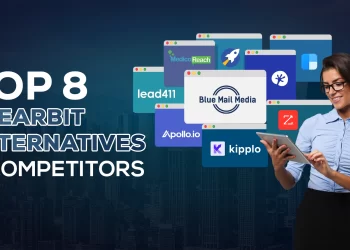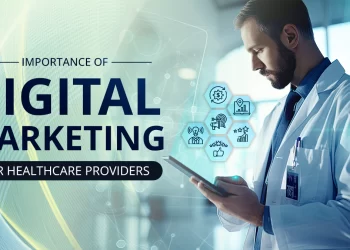In the last few years, the subject of data has been under immense observation. Presently, data-driven decisions are employed by a multitude of companies to help them make better decisions and succeed in the long run.
According to BARC, big data analytics offers a variety of benefits. The survey yielded the following results.
- 69% believe that analytics lead to better strategic decisions
- 54% believe that analytics lead to improved control of operational processes
- 47% believe that analytics lead to reduced cost
In addition, organizations claimed that they observed an 8% increase in revenue and a 10% reduction in cost.
As a result, the authority of data cannot be undermined. It is crucial for the Business-to-Business (B2B) model since it helps them make better decisions.
B2B is a business model in which a company creates products and services for other companies. In this model, the consumer plays no part, with businesses directly dealing with each other.
So, why does B2B rely on data as much as it does? Let’s take a look into the working of this model.
What is B2B Data?
Before we understand the reliance of B2B on data, it is important to know what B2B data is. This term is used to describe any insightful data that can contribute to the sales and marketing efforts of the company.
Alternatively, B2B data can be described as crucial information about other businesses. This information could factor in various elements like funding and revenue. Getting a hold of this data allows you to devise targeted marketing campaigns and help increase your clients.
B2B data can primarily be obtained via two methods – internal data and third-party external data. Usually, businesses purchase their data from external B2B data providers.
Not only do these third-party sources provide insightful data, but they also save you from the hassle of looking for b2b email list yourself. Ultimately, you can entirely focus on the other aspects of your business.
Moreover, B2B data providers provide analytics in various types. Each form is vital to enable better decision-making for your business.
What are the Types of B2B Data?
Each form of B2B data revolves around a different domain. As a result, when you combine all these types, you will obtain complete information about the company’s record.
Depending on the nature of your business, some types may be more valuable to you than others. Even so, all of them are essential to understanding the market and growing your business. Some of the most common types include:
Demographics Data
As the name suggests, B2B data providers obtain personal details along with an individual’s geographical location. They usually aggregate this statistic from multiple sources or collect it from open sources on the internet.
Some of the data collected include name, age, location, employment history, and skills.
Firmographics
This data handles the categorical aspects of a company. It is used to recognize the company’s structure, qualities, and other identifiers unique to it. By providing firmographics, B2B Marketing data providers help you segment organizations into different groups.
The information gathered includes industry type, sales and revenue, organizational style, and current location, among others.
Technographics
Information about the tools and technology utilized by the company is obtained through technographics. It helps you align your product with the company’s technological requirements, helping you stay ahead of the competition.
Standard information obtained in technographics includes tech stack lists, features, and integrations.
Intent Data
Through intent data, B2B data providers provide information about the company’s recent business activities. Moreover, it factors in the intent related to a product or service, further providing information about what the company is more likely to purchase.
Intent data includes elements like page views, downloads, and organization subscriptions.
Accurate data is instrumental in devising an effective B2B business strategy. Due to these reasons, multiple external B2B data providers have emerged recently, but how many are effective?
Who are the Best Data Providers of 2023?
With B2B businesses increasingly relying on external data providers, knowing the best B2B data providers present in the market is vital. Moreover, purchasing data from these external sources help saves time and reach out to a wider demographic in a single go.
Based on factors like product reviews, quality of services, and revenue generation, a few B2B marketing data providers stand out. Keeping these factors in mind, here is a list of the top B2B data providers of 2023.
1. Blue Mail Media
Blue Mail Media distinguishes itself with its updated B2B contact records, providing accurate data to allow for multi-channel marketing campaigns. Moreover, it provides unparalleled quality and quantity, boasting over 100 million data records.
Through the use of this platform, you can successfully connect with niche prospects seamlessly across numerous industries.
2. Thomson Data
Thomson Data has been one of the leading B2B data providers, helping fuel your business with accurate data. Moreover, it boasts of targeted database services that allow you to alter your data needs as required.
With over 70% customer retention and over 75 specialized segments to choose from, Thomson data is a must-try for all your data sourcing needs.
3. InfoClutch
A distinguishing feature of Infoclutch is its pristine collection of industries and technology solutions. Ultimately, this allows for seamless lead generation and yields effective results. In addition, it offers customized solutions for all your B2B data generation needs.
Moreover, features like white papers allow businesses to understand an issue and address it accordingly.
4. MedicoReach
Ranked among the best B2B healthcare data providers, MedicoReach stands out due to its focus on the healthcare domain. The highly reliable and efficient data from this platform helps your business target healthcare executives and other professionals from the industry.
MedicoReach ensures that your data is derived from certified sources with a broad reach across the globe. These may include nurses, specialists and administrators, clinics, mental health facilities, and home healthcare agencies, among others.
5. eSalesData
With over twelve years of presence and unmatched experience, this platform offers a hassle-free experience as a database provider. It provides accurate and verified data with competent data-related services and solutions.
The presence of over a million verified B2B contacts further accentuates its authenticity. Moreover, the data is collected from trusted sources across 1120 industries, ranging from aerospace to agriculture.
6. ZoomInfo
This platform is another one of the best B2B data providers in the market. It offers a one-stop shop to connect with multiple valuable buyers. It consists of the world’s first revenue operating system, with a unified system of data, insights, software, and integrations.
The OS helps identify, engage and convert customers within the addressable market of your business.
Use Cases of B2B Data
Let us break this down into simple steps. As discussed before, B2B data is primarily used by businesses to generate sales and expand their reach.
For the same purpose, this obtained data’s use case falls under three categories.
- Lead generation
- Outbound sales
- Analytics
To understand the use cases properly, it is essential to look at these factors individually.
1. Lead Generation
The most important use for B2B data is perhaps lead generation. A business can enhance its marketing and sales strategies through leads, resulting in increased conversions.
For instance, if your business is in the software domain, you would be relying on technographic data to understand a business’s technological capability. This lead will allow you to understand if the prospective customer needs additional software.
In addition, you can also use lead generation for other purposes. It can help you reach your ideal customer profile (ICP), allowing you to tailor your campaigns specifically towards the demographic. Other uses include the following.
- Research and Analytics
- Cold Outreach
- Account-based marketing
- Lead scoring
2. Outbound Sales
A simple example of outbound sales is when your team contacts a prospective client first. The team can make this contact through various sources, including email and direct contact.
Contacting a prospective client may be complex at times since you have to explain the entire crux of your business to them. Since the customer is a lead generated by providers of B2B data, there are increased chances of conversion.
As a result, you might be able to close the deal in a relatively short amount of time. Moreover, there is a high chance the customer might refer your business to others if he is satisfied with the products or services you generate.
3. Analytics
There is a reason that research and analysis are constantly being performed in day-to-day operations. Not only does it help enhance the product or service, but it also benefits marketing and sales. Analytics also help analyze your business’s risk, market growth, and competition.
Multiple forms of B2B data like demographics and intent data are instrumental in competitive analysis. These data sources help you keep track of your competition’s inventory and quality.
You can also track market growth and identify the gaps within it. This analysis helps you develop a new product or service that might cater to the mentioned gap. Alternatively, you can also improve internal processes to increase your product’s quality.
Leveraging your B2B data can also help you with other aspects. Take a look below to know what they are.
- Risk analysis
- Generating updates for your products or services
- Identifying your ICP
Summing Up
With the advent of multiple B2B data providers in the USA has no shortage of data-generating sources. By outsourcing data collection to an external provider, your business can focus on effectively marketing its products or services.
These B2B contact data providers usually have a wide array of specialized tools at their disposal. These tools are specifically geared towards generating data that can help your business adapt accordingly.
Irrespective of the size of your business, you must ensure that you maximize the use of these tools. In the long run, you will realize how much your business has benefited from a simple decision you made years ago.
You May Also Like:
- Top Collaborative Technology Solutions in 2022
- Empowering Users With the Latest Asset Management Technology
Gracie Johnson is a Senior Content Writer at MyTechMag. She is an enthusiastic learner and loves to explore all the areas of technology.








